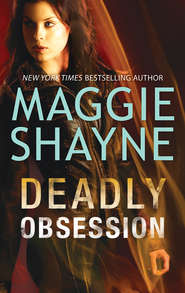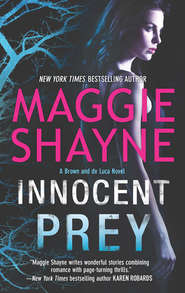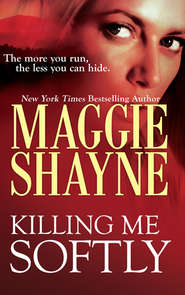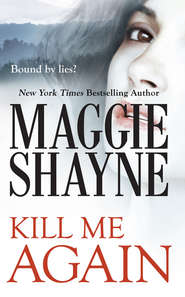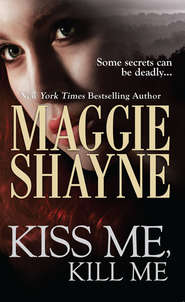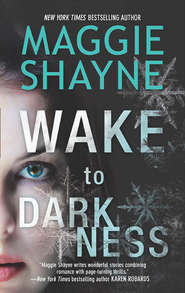По всем вопросам обращайтесь на: info@litportal.ru
(©) 2003-2025.
✖
Darker Than Midnight
Настройки чтения
Размер шрифта
Высота строк
Поля
“Honey,” Frankie said, “this is Blackberry. The whole town probably knows what time you arrived and what your mother made you for breakfast.”
“Small towns,” Jax said with a shake of her head.
“It’s not all bad,” her mom told her. “People may know a lot of your business, but not all of it. It’s nice that they care enough to want to know what you’re willing to share, but also enough to know when to leave it alone.”
Jax shot a look at her father.
“She means they don’t pry here,” her father interjected. “I’ve confided in Frankie about my past. But I’ve seen no sign that it’s gone any further.”
“It hasn’t,” Frankie assured him. “Nor will it.”
He nodded. “I don’t deserve your loyalty, Frankie, but I do appreciate it.”
“Of course you deserve it.” Frankie patted his hand across the table. “We’ve all done things we wish we could undo.”
“Few as much as I,” he said softly.
“Dad, you paid for what you did.”
He met Jax’s eyes, and for a moment they were so dark, so sullen, she didn’t even recognize them. But then he looked away. Her father was a haunted man. Sometimes she wondered if he knew the truth—but no. He couldn’t possibly. It would kill him if he knew.
Mariah said, “You’ve had all day to think it over, Cassie. Don’t keep us in suspense any longer than you have to. Have you made a decision yet?”
Jax tore her worried gaze from her father, sent her mother a nod and a smile, then focused on the chief of police. “I’ve decided to take you up on your offer to stay in the house and shadow you on the job for the next two weeks. And—hell, there’s not much point playing cutesy, is there? Unless something really troubling crops up, or you decide to withdraw the offer, I imagine I’ll be accepting the job when the two weeks are up.”
“Hot damn!” Frankie said with a smile. “Well, this calls for a celebration!” Even as she said it, a pretty young waitress arrived, dressed in black pants with a knife-sharp crease, spotless white blouse, red ribbon tied in a bow at her collar, and carrying an order pad in her hand.
“Champagne?” Frankie asked the others.
“I prefer a nice cold beer,” Jax said. “In the bottle.”
“Ahh, me, too,” Frankie said. “But make mine an N.A., in a frosted mug.”
“Mariah and I will have wine. A nice merlot. You choose,” Ben told the waitress.
The girl smiled brightly and trotted off to get the drinks. Jax said, “I’m kind of looking forward to spending the night at the house tonight.”
“Tonight?” her mother asked.
“Sure. Why not?”
“Well, the power’s not turned on. There’s no phone yet, no heat….”
“I can have the utilities turned on fast,” Frankie said. “But not that fast. By tomorrow, for sure.” She shrugged. “On the other hand, I’ve already got a bed set up in the master bedroom. Even took over some fresh sheets and blankets for you, got it all made up and ready. No other furniture in the place yet—I planned to do that tomorrow, as well.”
“You don’t need to furnish the house, Frankie. That’s asking too much,” Jax said.
“Oh, I won’t be. Not all by myself. Your parents have some things in storage, and several others around town have items they want to contribute. I mean, you’ll want your own things once you decide to make it your permanent home, but these will do for your two-week trial period,” Frankie said with a smile, as if she knew damn well Jax would be staying.
“You should stay with us tonight, hon,” Mariah said. “It’s not safe to be in that house all alone.”
Jax put a hand over her mother’s on the table. “It’ll be an adventure. Like camping out when we were kids.”
“Carrie always hated it,” Mariah said softly.
“Only because I always managed to find something slimy to put in her sleeping bag before sunup. Frogs, lizards—”
“You were such a brat.” Her mother turned her hand over, closing it around Jax’s.
“I’ll have the fireplace for heat. Dad, you can loan me a couple of your lanterns. It’ll be fun.”
Mariah looked to her husband as if for backup. But Benjamin was studying his daughter and nodding in reluctant approval. “She’s a grown woman, a police officer, Mariah. She’ll be fine.”
“Thanks, Dad.”
He nodded, smiling slightly.
The waitress arrived with their drinks and handed them around. Jax twisted the cap off her longneck bottle. Frankie lifted her mug. “Here’s to the newest resident of Blackberry,” she said. “Welcome home, Jax.”
“Welcome home,” her parents echoed.
They clanked their drinks together as the waitress hovered, ready to take their orders.
Driving the dead orderly’s car had become more and more difficult, and finally impossible. The third time River veered off the road, and went skidding through the slush on the shoulder, he’d taken out two mailboxes. At first, he thought he’d hit two human beings. It shook him too much to continue. He didn’t want to kill anyone else. He didn’t want to end up dead himself—not until he found the answers he needed to find, at least.
Besides, he was pretty sure he’d been seen. Another car had passed, heading in the opposite direction, just as he’d lost control that last time. The driver probably called the cops. Probably reported him as a drunk driver. Maybe not.
Didn’t matter. He couldn’t drive anymore.
He steered the car up a side road, where the only other tracks in the snow had been made by a logging truck, by the looks of them. And then he drove until the tires spun in the snow.
After that, he got out and took a look around. His mind kept wandering, but he managed to keep tugging it back on track. He knew where he was. In a tall pine forest outside Blackberry. Five miles to town, on foot, but less if he cut through the woods. It had been a while since he’d spent any time in the woods.
He used to, though. All the time. Him and Ethan. When they were kids. The trips with Ethan’s dad. Camping and hiking. As adults, they’d bought a hunting cabin together, the two of them. It wasn’t far from here—too far to walk, though. An hour by car. It had been their getaway. Stephanie called it their “He-Man Woman Haters Club.” God, they’d had some good times there.
River stopped walking, vaguely aware he’d let his mind wander again. He wasn’t sure which way he’d gone, had to check his tracks in the snow to tell which direction the road was. “Have to stay focused,” he muttered. He managed to get his bearings. The fire trail was off to his left. He headed for it, knowing it cut kitty-corner through the southeastern edge of Blackberry and ended at the pond across the street from his house.
He was weak, he realized as he set off again. Every step in the packed snow was an effort, and every steamy breath came harder. It was probably no wonder. He’d done nothing but sit in a hospital for a year. The meds had killed his appetite months ago, to the point where only the threat of a feeding tube forced him to down a few bites of the meals that were brought to him, and even that small amount made his stomach buck in rebellion. Four miles. Surely he could manage that much.
He did, but by the time he emerged from the woods across the street from his long-lost home, he was so cold he’d stopped shivering. No coat. He should have taken that into account. The orderly’s shoes were a size too small, and designed for padding softly through hospital corridors, not for trudging through snow. River’s feet had long since gone numb, so his stumbling gait had more than just a chemical cause.
It was night; he couldn’t guess how late, but it wasn’t dark. The full moon hung low, spilling its milky light over the snow, over his house. Or what remained of it. He noted the absence of the entire wing, but also noted that the place looked to be in excellent condition, given what had happened.
The square, main part of the house remained, pristine white with those green shutters and purplish trim, colors Steph had chosen. The big oak door. It had an arched, stained-glass panel above that matched the slender ones to either side. He looked up higher, at the tall, narrow bedroom windows on the second floor. One of those bedrooms had been his and Stephanie’s. Another was going to be the nursery. The wing had held a two-car garage and a huge family room, with guest rooms upstairs. One of those guest rooms was the room where Stephanie had died.
Gone now, except for bits of the foundation showing through the snow. Vanished, like his life. And any possible reason he might have had for living it.
He sank to his knees in the snow, braced his hands in its frigid depths to keep from falling facedown. God, he was cold. And dizzy. And so very tired. The walk had drained him. He hadn’t walked more than a few yards at a stretch during his time in the hospital. From his room to the community room. More often just within the confines of his room, where he’d preferred to stay alone. He never had to walk to the isolation room, the proverbial “rubber room,” where they took him when they decided he had become agitated or violent. He had found himself there a number of times, confined in a straitjacket. Ethan would tell him the things he’d done, but he wouldn’t remember them. It was sheer hell to finally realize he was capable of violence during his blackouts. He would never have believed it if Ethan hadn’t told him himself, witnessed it himself.






